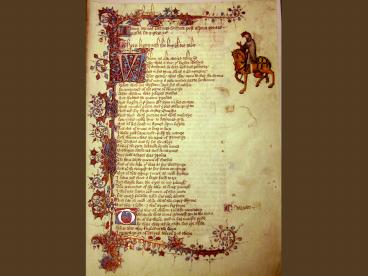Geoffrey Chaucer - PowerPoint PPT Presentation
1 / 25
Title:
Geoffrey Chaucer
Description:
Physiognomy A science that judged a person s temperament and character based on his or her anatomy. ... Physiognomy Irony Features of Chaucer s writing. – PowerPoint PPT presentation
Number of Views:305
Avg rating:3.0/5.0
Title: Geoffrey Chaucer
1
(No Transcript)
2
Turn to page 102.
- Whan that April with his showres soote
- The droughte of March hath perced to the roote,
- And bathed every veine in swich licour,
- Of which vertu engendred is the flowr,
3
Anticipation Guide
- What do you already know about the Middle Ages?
The Westgate is a massive medieval gatehouse in
Canterbury, Kent, England
4
Medieval English Society1066-1485
- The Canterbury Tales
- by Geoffrey Chaucer
- Chaucer creates characters that help us
understand the complexities of this historical
time period.
5
9 Literary Devices
- 1.) Satire
- 2.) Irony
- 3.) Allusion
- 4.) Couplet
- 5.) Frame Story
- 6.) Dynamic and static characters
- 7.) Allegory
- 8.) Direct and indirect characterization
- 9.) Humor
6
Characteristics of the text.
- Estates Satire- Sets out to expose and ridicule
typical examples of corruption at all levels of
society. - Satire- writing that ridicules human weakness,
vice, or folly to bring out social reform. - Shows absurdities.
- It is the readers job to untangle the meaning of
what is implied
7
Class Structure
- Feudal group- Fighting each other to get what
they want - Ecclesiastical group- People who run the church
- Urban group- People out to make money
- What determines status?
- Birth, wealth, profession, personal ability, etc.
8
Geoffrey Chaucer(1343-1400)
- Father was a middle class wine merchant.
- Became a page (servant to a knight) in a royal
household as a teenager.
9
How the text got to us
- Although he was born a commoner and continued to
associate with commoners in his official life, he
did not live as a commoner and although his
training and service at court, his wifes
connections, and probably his poetry brought him
into contact with the nobility, he must always
have been conscious of the fact that he did not
really belong to that society of which birth
alone could make one a true member. - (Norton Anthology of English Literature 216)
10
A pilgrimage from London to Canterbury
11
The following are techniques used to interpret
the text.
- This classical piece of literature is layered
with complexities that need to be sorted out. - These techniques can help you interpret many
different kind of texts they are not exclusive
to just this one. - We will test how effectively they are used.
12
Physiognomy
- A science that judged a persons temperament
and character based on his or her anatomy. - The most exaggerated facial features are those of
the peasants. - Example
- The Miller represents the stereotypical peasant
physiognomy most clearly round and ruddy, with a
wart on his nose, the Miller appears rough and
therefore suited to rough, simple work.
13
Irony
- We will be drawing out ironic implications in the
text. - Irony- a contrast between expectation and
reality, between what is said and what is meant,
between what appears to be true and what is
really true.
14
Features of Chaucers writing.
- Frame story a plot structure that involves the
telling of one or more stories within another
story. - Couplet two lines in poetry that rhyme.
15
Allegory
- A story with two meanings
- Literal and symbolic.
16
Direct Characterization
- Direct- a writer uses words to tell what a
character is like. - Example words sympathetic, kind, ambitious,
etc.
17
Indirect Characterization
- A writer lets the reader form opinions by
- 1.) describing how a character looks or dresses
- 2.) using the characters own words
- 3.) revealing what the character is thinking or
feeling - 4.) showing the effect the character has on other
people - 5.) showing how people react toward the character
- 6.) showing the characters actions
18
(No Transcript)
19
We are going to doodle.
- http//www.ted.com/talks/sunni_brown.html
- 145
20
Expert Group Project
- Characters that we will explore
- Group 1 Knight
- Group 2 Nun
- Group 3 Friar
- Group 4 Oxford Cleric
- Group 5 Franklin
- Group 6 Doctor
- Group 7 Wife of Bath
- Group 8 Parson
- Group 9 Manciple
21
The Wife of Baths Tale
- Pages 133-148 in the textbook.
22
Dynamic and static characters
- Dynamic characters- characters that change
throughout the story. - Static characters- characters that stay the same
throughout the story.
23
Example
- In the movie The Titanic
Cal Hockley, Rose's fiancé, is a static
character.
Rose is a dynamic character.
24
Allusion
- Indirect inference to something else.
Humor
A quality that makes characters and their
situations seem funny, amusing, or
ludicrous. Examples puns, word play, satire,
sarcasm, parody, subtle wit, etc.
25
Wife of Bath
- Theme Women should have sovereignty over men in
marriage.































